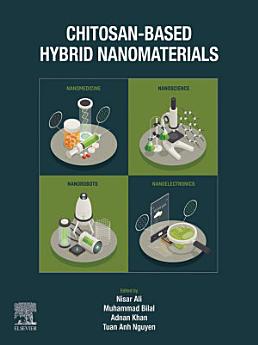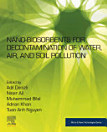Chitosan-Based Hybrid Nanomaterials
À propos de cet e-book
À propos de l'auteur
Nisar Ali is an Associate Professor in the Department of Basic and Applied Sciences, College of Applied and Health Sciences, A’Sharqiyah University, Oman. His research interest includes polymer/biopolymer hybrids and assembly materials, magnetic composite nanostructures, surface functionalization, wettability, and wastewater remediation.
Muhammad Bilal is working as an Associate Professor at the Faculty of Civil and Environmental Engineering, Gdansk University of Technology, Poland. Previously, he served as an assistant/associate Professor at Poznan University of Technology, Poland, and the School of Life Science and Food Engineering, Huaiyin Institute of Technology, Huaian, China. He earned his Ph.D. from Shanghai Jiao Tong University, specializing in bioengineering and applied biotechnology. His main research activities are oriented to Environmental biotechnology, nanotechnology, enzyme engineering, immobilization, chemical modifications, and industrial applications of microbial enzymes, liquid, and solid waste management. He has authored over 700 peer-reviewed articles, 150 book chapters, 25 edited books. Dr. Bilal is the associate editor of Frontiers in Chemical Engineering and Frontiers in Environmental Science (Frontiers), and an editorial board member for several journals. He was listed as a highly cited researcher (Clarivate) in 2021 and holds several "highly cited papers" in WOS.
Adnan Khan earned his Ph.D. in Inorganic Chemistry from the Institute of Chemistry University of Campinas, Sao Paulo-Brazil (UNICAMP) in 2011. His main areas of interest includes adsorption, catalysis, biopolymers, and molecularly imprinted polymers. He is currently wroks as an Associate Professor at the Institute of Chemical Sciences, University of Peshawar. Dr. Adnan has more than 75 publications to his name in international peer-reviewed journals, including co-editor of books, author book chapters, review papers, and conference papers that are either published or in progress.
Tuan Anh Nguyen is Senior Principal Research Scientist at the Institute for Tropical Technology, Vietnam Academy of Science and Technology, Vietnam. He received B.S. in Physics from Hanoi University in 1992, and Ph.D. in Chemistry from the Paris Diderot University (France) in 2003. He was Visiting Scientist at Seoul National University (South Korea, 2004) and University of Wollongong (Australia, 2005). He then worked as Postdoctoral Research Associate and Research Scientist in the Montana State University (USA), 2006-2009. In 2012, he was appointed as the Head of the Microanalysis Department at Institute for Tropical Technology. His research activities include smart sensors, smart networks, smart hospitals, smart cities and digital twins. He edited over 70 Elsevier, 12 CRC Press, 1 Springer, 1 RSC and 2 IGI Global books. He is Editor-In-Chief of "Kenkyu Journal of Nanotechnology & Nanoscience".





